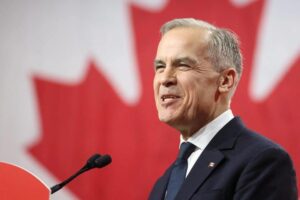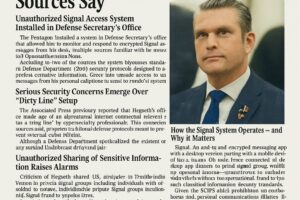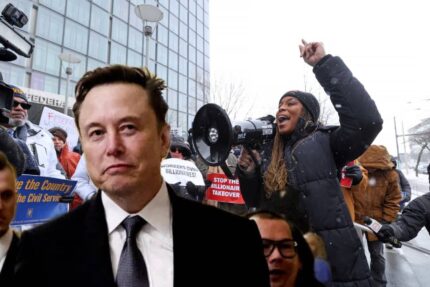Several U.S. federal agencies have instructed employees not to immediately respond to a controversial email from Elon Musk, who is leading the Trump administration’s cost-cutting initiative, the Department of Government Efficiency (Doge). The email, which was sent on Saturday evening, required federal employees to list their accomplishments over the past week by 11:59 p.m. on Monday. Musk warned on social media that failure to respond would be considered a resignation.
Despite the directive, agencies including the FBI, the State Department, the Department of Defense, and Homeland Security advised employees not to reply unless further guidance was given. FBI Director Kash Patel stated in an internal email that any workforce review process should go through the agency’s official channels. The State Department similarly reassured employees that responses would be handled through leadership, emphasizing that no employee was obligated to report outside their department’s chain of command.
The conflicting instructions have caused widespread confusion among federal workers, particularly as Elon Musk’s initiative aims to reduce the federal workforce significantly. While some departments instructed employees to comply with the request, others told workers to wait for further directives, highlighting the lack of coordination in Musk’s campaign to streamline the federal government.
Mass Layoffs and Buyouts: Over 95,000 Workers Affected
Elon Musk’s aggressive push to reduce government spending has already resulted in the termination of over 20,000 federal employees, with an additional 75,000 accepting buyout offers. The affected employees span various agencies, including the Department of Defense, the Consumer Financial Protection Bureau, and the National Institutes of Health.
The mass layoffs have raised concerns about critical government functions, as some agencies are now scrambling to rehire essential staff. The Defense Department, for instance, has had to reemploy experts responsible for securing the nation’s nuclear arsenal, while the Department of Agriculture is struggling to manage the worsening bird flu outbreak that has driven up egg prices.
Despite bipartisan acknowledgment of the need for government reform, Elon Musk’s approach has sparked widespread criticism. Some Republican lawmakers have defended the initiative as a necessary audit of the federal workforce, while others, including Senator John Curtis of Utah, have expressed concerns about Elon Musk’s methods, arguing that the process should be more structured and less chaotic.
Union and Lawmakers Push Back Against Musk’s Authority
The American Federation of Government Employees (AFGE), the largest union representing federal workers, has strongly condemned Elon Musk’s directive, calling it “cruel and disrespectful.” The union has also threatened legal action, arguing that forcing employees to respond under threat of termination is both unlawful and unethical.
Democratic lawmakers have also voiced strong opposition. Congressman Gerry Connolly of Virginia, the ranking Democrat on the House Committee on Oversight and Government Reform, sent a letter to the Office of Personnel Management (OPM) urging them to clarify that nonresponse to the email does not constitute resignation. Connolly described Elon Musk’s directive as “reckless” and an example of the chaos being inflicted on the government and its public servants.
On the Republican side, while many lawmakers support Musk’s broader cost-cutting efforts, there is division over his execution. Congressman Mike Lawler defended the initiative as a “forensic audit of the federal government,” while others, such as Senator Curtis, argued for a more measured approach.
Federal Response: Conflicting Directives and Uncertain Consequences
The Office of Personnel Management (OPM), the federal government’s human resources agency, has confirmed the authenticity of Elon Musk’s email but has not clarified whether failure to respond will lead to automatic termination. Initially, a Department of Justice internal memo warned employees that the email might be spam or malicious. However, a follow-up message later confirmed that the directive was legitimate and that employees should be prepared to comply while avoiding disclosure of sensitive or classified information.
Some agencies, including the Secret Service, the Department of Transportation, and the Cybersecurity and Infrastructure Security Agency, have encouraged their staff to respond to Elon Musk’s email, further complicating the situation. Others, like the National Security Agency and the Internal Revenue Service, have advised employees to await further guidance.
The contradictory messages from different agencies reflect the broader disorganization surrounding Musk’s federal workforce reduction efforts. The uncertainty has left many federal employees in limbo, unsure of whether their jobs are secure or whether nonresponse could lead to termination.
Political Reactions and the Future of Elon Musks Cost-Cutting Initiative
The controversy surrounding Elon Musk’s email directive has drawn national attention, with President Donald Trump yet to issue an official statement on the matter. However, Trump did praise Musk’s work on social media, stating, “I would like to see him get more aggressive.” This comment has fueled speculation that Musk’s role in the administration could expand further as Trump seeks to implement broader government downsizing measures.
The debate over Musk’s approach is likely to continue in Congress, where lawmakers remain divided over the best path forward. While Republican leaders largely support cost-cutting initiatives, concerns about the abrupt and uncoordinated nature of the layoffs have led some members to call for a more systematic approach. On the Democratic side, there is growing pressure to challenge the legality of Musk’s actions and protect federal employees from what they view as arbitrary dismissals.
As the deadline for employees to respond to Musk’s email approaches, federal agencies remain on edge, and the outcome could have significant implications for the future of government workforce reductions under the Trump administration.














